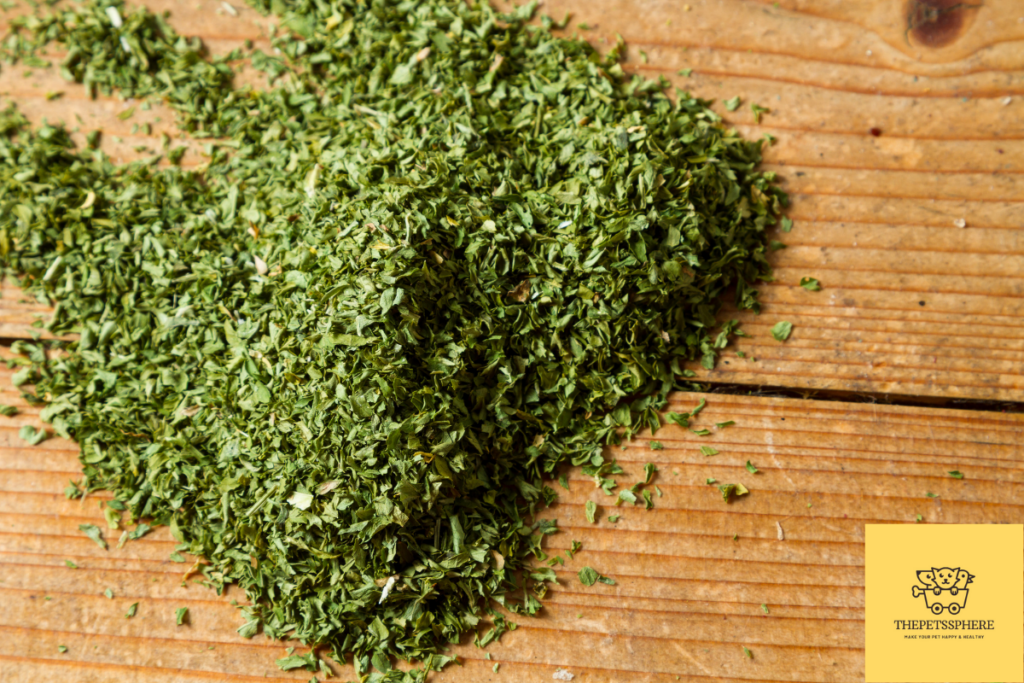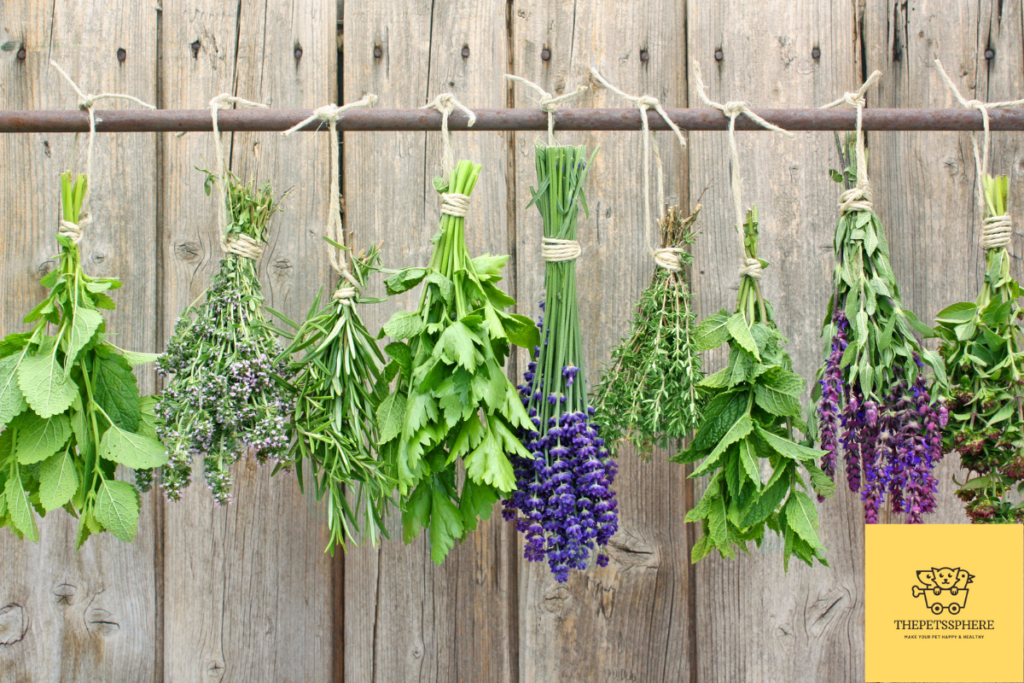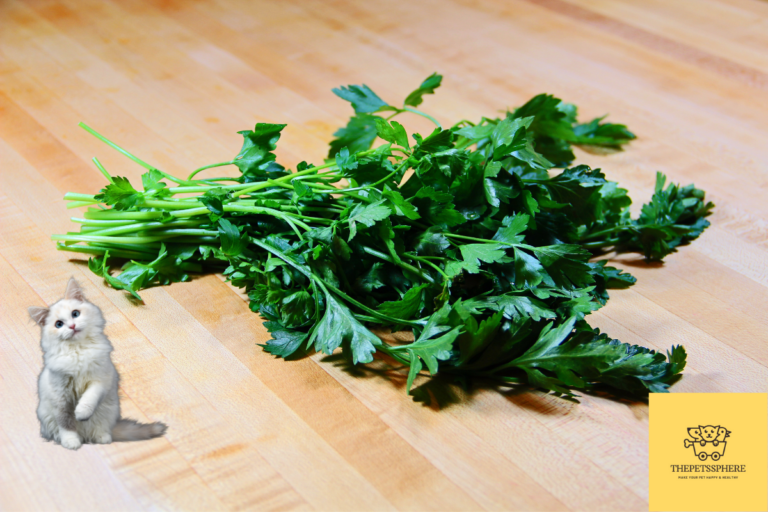Parsley is a safe herb for humans to consume, but can cats eat parsley? It’s up to you whether or not you want to feed your cat this healthy food!
As a proud owner of a cat, you may be thinking about whether your cats safely eat parsley or not.
The answer is yes.
Cats can safely consume parsley as it has some health benefits for your cats. However, cats can have allergic reactions, and can also develop kidney stones from eating too much of this herb.
Now let’s talk about some health benefits and risks of feeding parsley to your cat. We will also answer some of the most commonly asked questions related to this.
5 Surprising Health Benefits of Parsley for your Cats
Did you know that parsley can be used as a natural remedy for your cats? Now, we’ll go over 5 surprising health benefits of parsley.
1) Parsley is an excellent source of vitamin C and other antioxidants which are important for strengthening the immune system.
2) The potassium in parsley helps to balance fluid levels, which may help prevent kidney stones from forming.
3) Parsley also contains significant amounts of iron, calcium, and magnesium which can all contribute to healthy bone development in kittens and cats. Zinc also helps cats maintain a healthy immune system which can prevent them from getting sick in the first place!
4) Parsley has been shown to stimulate blood flow by dilating blood vessels, so it’s especially helpful if you’re trying to treat arthritis or any condition involving poor circulation in your cat’s joints.
5) Parsley can be used to help prevent hairballs in cats by using a handful of fresh, chopped parsley and adding it to your cat’s daily diet.
Did you know that parsley is packed with important nutrients like antioxidants? It can even reduce the risk of heart disease.
Can Parsley Make Cats Sick?
Parsley is a herbal plant that many people use to spice up their cooking. It may seem harmless, but it can actually cause some serious digestive problems for your cat if they consume a larger amount at a time!
Now let’s look at the information about the risks of feeding too much parsley to your cat.
1) Parsley contains high levels of oxalates and calcium oxalate which can form stones in the urinary tract as well as other organs like kidneys and bladder. These are painful and difficult to remove surgically or non-surgically, so be careful with how much you feed them!
2) Parsley also has an extremely potent smell that cats are not accustomed to from a young age, meaning they will likely find it revolting when they get older even if they can’t taste the difference.
Is Parsley Water Good for Cats?
Parsley is a popular herb that has many health benefits for humans. It can be used as an appetite stimulant, detoxifier, and weight loss aid. Parsley water also has many health benefits for cats! Some of the most common cat diseases are kidney disease, diabetes mellitus and urinary tract infection (UTI).
Parsley water helps with these diseases by lowering blood glucose levels in diabetic cats, managing UTIs in both male and female cats and preventing kidney stones from forming which may help prevent or treat renal failure in ill or aging felines. These herbs have been proven to lower blood pressure too which might make them good for treating hypertension in your kitty friend.
Give your kitty the chance to enjoy these amazing benefits by making them parsley water with this easy recipe: Add 3 sprigs of fresh parsley into 2 cups of boiling water. Allow it to steep for 10 minutes before straining out the leaves and pouring the liquid over your pet’s food dish or directly onto their food.

Can Cats Eat Dried Parsley?
Cats are curious creatures and will eat anything they can get their paws on. Dried parsley has some health benefits for your kitty. They improve your feline’s digestion, increase their energy levels, etc. But on the other hand, Dried parsley can be harmful to them if consumed in a larger amount.
Now, Let’s look at the cons of offering dried parsley to your kitty.
1) Dried parsley contains a chemical called apiol that is toxic to pets and people alike, causing vomiting, diarrhea, loss of appetite, and lethargy among other symptoms. So if they are consuming a larger amount, then it may cause some issues.
2) Parsley’s high levels of oxalates mean that it has an astringent effect that can cause urinary tract problems in felines including crystals or stones in the bladder. In extreme cases, it requires surgery to remove them.
Are Cats Attracted to Parsley?
The smell of fresh parsley makes some cats go crazy. But why? There are many reasons why a cat might be attracted to the herb, but there is one that stands out as the most likely.
It has been found that the smell of fresh parsley mimics feline pheromones (or hormones). Cats have an unusually strong sense of smell and they use it to find mates in heat or even their mother’s milk. The scent brings them comfort and makes them feel safe because it is so familiar.
3 Reasons Why Some Cats Are Attracted To Parsley
1) The pungent aroma may remind them of their own odor or urine marking their territory.
2) Parsley contains high amounts of vitamins A, C, and K as well as beta-carotene. Cats can absorb these vitamins through their mouths as humans do with vegetables or fruits.
3) Cats may find this texture interesting and want to explore it with their paws or tongue.
4) Lastly, some people speculate that a lot of cats have learned from mice who like to eat parsley as one way to survive during winter months when other plants aren’t available for them to eat because they don’t hibernate.
How to Feed Parsley to your Cat Properly
If you’re looking to give your cat a new experience, parsley is a great option! Parsley comes from the same family as carrots and celery. Like these two veggies, parsley contains a lot of vitamin A which is important for eye health. But don’t worry too much about giving your cat too many greens because parsley is low in oxalic acid- a substance that can cause kidney stones in cats. In this blog post, I’ll share 3 ways to feed it safely to your kitty!
- Chop up some fresh leaves and mix them in with their food.
- Add powdered dried parsley to wet food or water.
- Place small pieces of fresh or frozen parsley on top of dry food or can also just give them a few leaves to nibble on.

What Herbs Can Cats Eat?
Cats are naturally carnivores and they have a diet high in protein. They typically eat mice, fish, or birds but some cats will also eat grasses and plants.
Herbs that are safe for cats to consume include valerian, chamomile, lavender, mints (spearmint), rosemary (fresh only), feverfew (fresh only) sweet marjoram (fresh only).
These herbs may help with sleep issues and anxiety attacks. A list of other plant-based foods that may not be harmful to your kitty includes:
- Burdock
- Caraway seed
- Chamomile flowers (fresh only- can be toxic when dried or cooked, so only feed your cat fresh ones)
- Chicory root
- Dandelion leaves and flowers (fresh only- toxic when cooked or dried, so only feed your cat fresh ones)
- Elderberry (fresh only- toxic when dried or cooked, so only feed your cat fresh ones)
- Lavender flowers (fresh only- can be toxic when dried or cooked, so only feed your cat fresh ones)
You can either cook these in oil or sprinkle them on your cat’s regular dry food. Remember not to use too much salt or pepper because this could upset their stomachs!
Concluding our thoughts!
Parsley is a healthy herb for humans to consume in large quantities but cats should eat it in moderation. Cats are able to safely consume parsley if consumed in small doses, such as what they might find on their food.
If you want your cat to benefit from the health benefits of parsley without any risk, make some parsley water by boiling 3 cups of water and adding chopped fresh or dried leaves (2 tablespoons). Let this boil until reduced by half then strain off the herbs. Your cat will enjoy drinking this delicious beverage with all the same health benefits!
Related articles on cat eat
- Can cats eat raw chicken breast
- Can cats eat bread crumbs
- Cats eat popcorn
- Is evaporated milk ok for cats
- Do cats get sick if they eat mice
- Do cats eat lobster
- Are chicken nuggets bad for cats
- Do cats eat bologna
- Can cats eat cheerios as a treat
- Do cats eat pine nuts
- Do cats eat imitation crab meat
- Do cats drink chocolate milk
- Can cats have zucchini
- Do cats eat beef jerky
- Do cats eat figs
- Do cats eat oranges
- Can cats have cashews
- Do cats eat pancakes
- Do cats eat frogs and toads
- Does cats eat pizza
- Is pudding bad for cats
- Are radishes bad for cats
- Do cats eat beans
- Can cats eat dog treats

